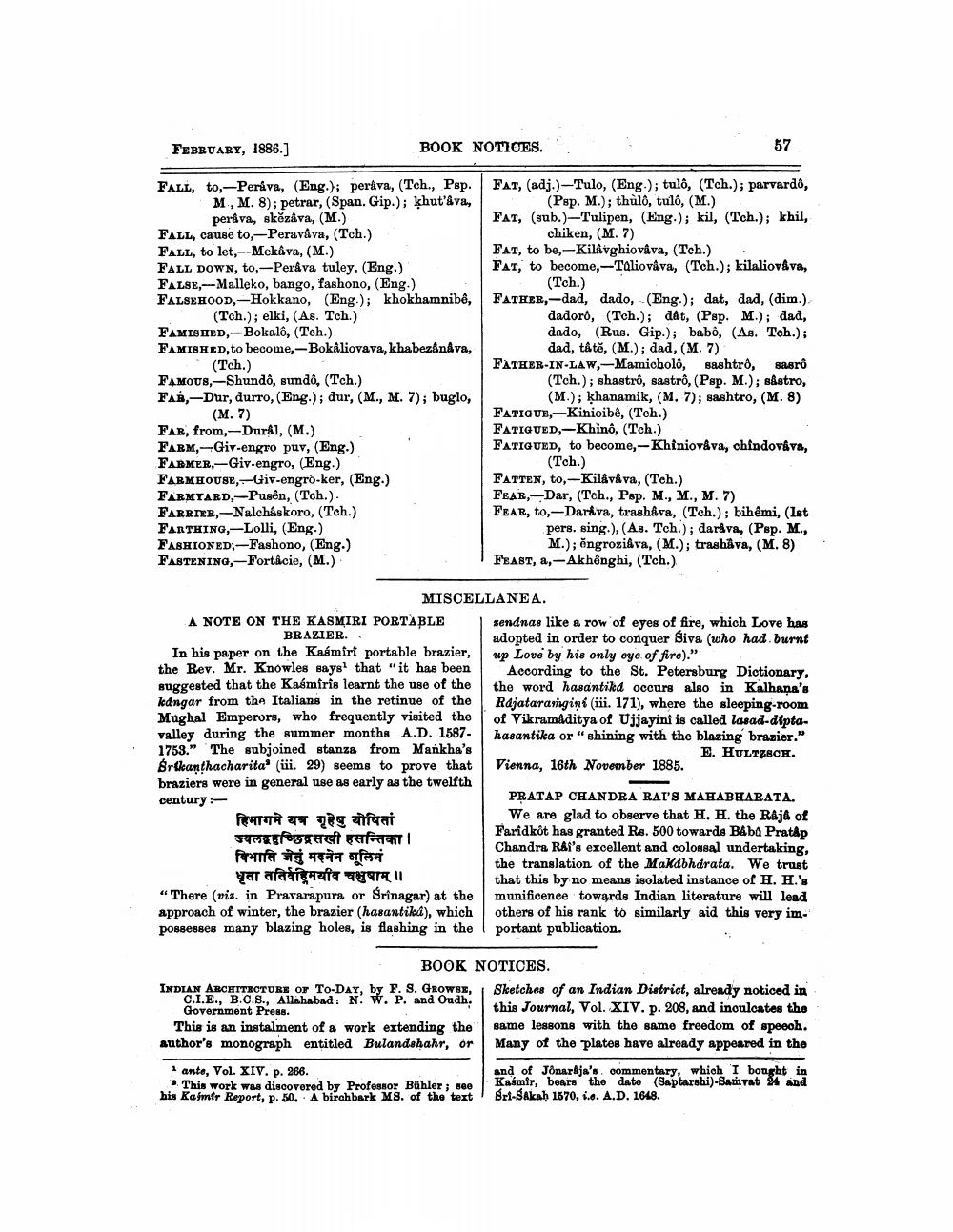________________
FEBRUARY, 1886.]
BOOK NOTICES.
57
FALL, to,-Peráva, (Eng.); peráva, (Tch., Psp.
M., M. 8); petrar, (Span. Gip.); ķhut'ava,
periva, skozáva, (M.) FALL, cause to,-Peravava, (Tch.) FALL, to let,--Mekâva, (M.) FALL DOWN, to,-Peråva tuley, (Eng.) FALSE,--Malleko, bango, fashono, (Eng.) FALSEHOOD, -Hokkano, (Eng.); khokhamnibê,
(Tch.); elki, (As. Tch.) FAMISHED,-Bokalô, (Tch.) FAMISHED, to become,-Bokaliovava, khabezândva,
(Tch.) FAMOUS, -Shundo, sundô, (Tch.) FAR,-Dur, durro, (Eng.); dur, (M., M. 7); buglo,
(M. 7) FAR, from,-Durál, (M.) FARM,--Giv-engro puv, (Eng.) FABMER, -Giv-engro, (Eng.) FARMHOUSE,--Giv-engro-ker, (Eng.) FARMYARD,-Pusên, (Tch.). FARRIER,- Nalchåskoro, (Tch.) FARTHING, -Lolli, (Eng.) FASHIONED;-Fashono, (Eng.) FASTENING,-Fortâcie, (M.)
FAT, (adj.)-Tulo, (Eng.); tulo, (Tch.); parvardo,
(Pep. M.); thūlo, tulo, (M.) FAT, (sub.)-Tulipen, (Eng.); kil, (Tch.); khil,
chiken, (M. 7) FAT, to be,-Kilâvghiováva, (Tch.) FAT, to become,-Taliováva, (Tch.); kilaliováva,
(Tch.) FATHER, -dad, dado,(Eng.); dat, dad, (dim.).
dadorð, (Tch.); dât, (Psp. M.); dad, dado, (Rus. Gip.); babo, (As. Toh.);
dad, tâtě, (M.); dad, (M. 7) FATHER-IN-LAW,-Mamicbolo, sashtrô, sasrû
(Tch.); shastrô, sastrô, (Psp. M.); såstro,
(M.); ķhanamik, (M. 7); sashtro, (M. 8) FATIGUE,-Kinioibe, (Tch.) FATIGUED,-Khino, (Tch.) FATIGUID, to become,- Khiniováva, chindováva,
(Tch.) FATTEN, to,-Kilâvåva, (Tch.) FEAR, -Dar, (Tch., Pep. M., M., M. 7) FEAR, to,-Darkva, trashåva, (Tch.); bihêmi, (let
pers. sing.),(As. Tch.); daráva, (Pep. M.,
M.); ingroziâva, (M.); trashava, (M. 8) Feast, a,-Akhênghi, (Tch.)
.
MISCELLANEA. A NOTE ON THE KASMIRI PORTABLE sendnas like a row of eyes of fire, which Love has BRAZIER..
adopted in order to conquer Siva (who had burnt In his paper on the Kasmirt portable brazier, up Love by his only eye of fire)." the Rev. Mr. Knowles says that "it has been
According to the St. Petersburg Dictionary, suggested that the Kasmiris learnt the use of the
the word hasantikd occurs also in Kalhana's kdngar from the Italians in the retinue of the
Rajatarangini (iii. 171), where the sleeping-room Mughal Emperors, who frequently visited the of Vikramaditya of Ujjayini is called lasad-diptavalley during the summer months A.D. 1587
hasantika or "shining with the blazing brazier." 1759. The subjoined stanza from Mankha's
E. HULTZSCH. Brucanthacharita' (üi. 29) seems to prove that Vienna, 16th November 1885. braziers were in general use as early as the twelfth century :
PRATAP CHANDRA RAI'S MAHABHARATA. हिमागमे यत्र गृहेषु योषितां
We are glad to observe that H. H. the Raja of ज्वलद्वहुच्छिद्रसखी हसन्तिका।
Faridkot has granted Rs. 500 towards B&ba Pratap
Chandra Rai's excellent and colossal undertaking, Ferra af
the translation of the Makabhdrata. We trust धृता ततिर्वहिमयीव चक्षुषाम् ॥
that this by no means isolated instance of H. H.'s “There (viz. in Pravarapura or Srinagar) at the munificence towards Indian literature will lead approach of winter, the brazier (hasantiká), which others of his rank to similarly aid this very im. possesses many blazing holes, is flashing in the portant publication.
BOOK NOTICES. INDIAN ARCHITECTURE OF TO-DAY, by F. S. GROWSE, Sketches of an Indian District, already noticed in
C.I.E., B.C.S., Allahabad: N. W. P. and Oudh. Government Press.
this Journal, Vol. XIV. p. 208, and inoulcates the This is an instalment of a work extending the same lessons with the same freedom of speech. author's monograph entitled Bulandshahr, or Many of the plates have already appeared in the
1 ante, Vol. XIV. p. 266.
This work was discovored by Professor Bühler bee his Kaimir Report, p. 50. A birohbark MS. of the text
and of Jônarfja's. commentary, which I bought in Kasmir, boars the date (Saptarshi)-Samvat 24 and Sri-SAkah 1870, 1.0. A.D. 1648.




